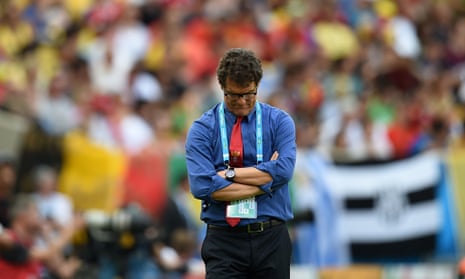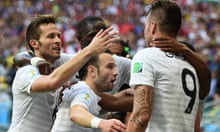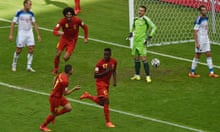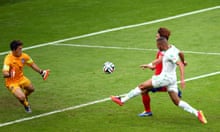Even from the moment Sepp Blatter unfurled the small rectangles of paper with a cartoon zany look as he revealed the winners of Fifa’s beauty contest, Russia’s status as a World Cup host of the future has been overshadowed. The decision was made in December 2010 but reaction to the World Cup heading to Eastern Europe for the first time in 2018 was nothing compared with the shellshock when the Fifa president grinned as he read out the word “Qatar” for 2022.
Russia passed comparatively under the radar on the controversy stakes. More recently, since the annexing of Crimea, there were serious concerns and Fifa had to step in to clarify that all would be well from its point of view. “The World Cup has been given and voted to Russia and we are going forward with our work,” said Blatter a few months ago.” That would appear to be that.
So, four years from now, the global television audience will zoom in on Russia, who will present the world with 12 stadiums (at least nine new builds), and 11 host cities. There will inevitably be a different atmosphere compared with a gathering in Brazil, which for all the socio-political agitation would always be an inspiring and sacred place for football.
The teams will make their way from St Petersburg in the north to Sochi in the south, from Kaliningrad, an enclave on the Baltic Sea, in the west to Yekaterinburg, in the Urals, marking the most easterly point for the tournament at the zone where Europe meets Asia.
Like any home nation, the emphasis to create a team to fire local imagination is intense. Fabio Capello’s Russia look some distance from that objective. So far in Brazil they have been dreary.
A draw salvaged by their stalwart Aleksandr Kerzhakov against South Korea, followed by a blunt defeat inflicted late on by Belgium, were delivered with few redeeming features.
The Italian coach was awarded a hefty contract extension before this Brazilian expedition to ensure he carries the team into the 2018 World Cup. As automatic qualifiers, there is time to prepare, but there does seem to be considerable work needed to polish this team into something capable of sparkling.
A defining image from this defeat was of Aleksandr Kokorin, the poster boy, lowering his head into his hands shortly before half-time as he skewed Russia’s cleanest chance wide. Perhaps the youthful attackers Capello chose will benefit from the experience (something that might ring a bell with folk in England). Kokorin, Maksim Kanunnikov and Oleg Shatov are all in their early 20s. In fairness, the opposition provided perfect evidence of how precarious it can be for a young talent finding his World Cup feet. This was not Romelu Lukaku’s day. Divock Origi took the Everton striker’s place to seize the moment. It would be foolhardy to rush to heavy judgment.
Having sleepwalked through most of the game Belgium were rewarded as they came alive in the closing stages. Briefly, Belgium metaphorically changed costume to resemble all the dark horse/golden generation stereotypes that had accompanied them since qualification to this World Cup.
Eden Hazard and Origi advanced in tandem, then the magic happened. As Hazard danced onwards, Origi pulled back, instinctively creating space for himself. Hazard tucked the reverse pass to the teenager, whose driven shot into the roof of the net was ruthless.
Belgium’s youngest goalscorer, at 19, enabled a squad bow at the end in honour of a comfortable passage to the knockout stage. Russia will meet Algeria next while Belgium take on South Korea.
Capello surely has to cajole something more inspiring next time out. The Russian delegation will return from Brazil with all manner of food for thought for 2018.







